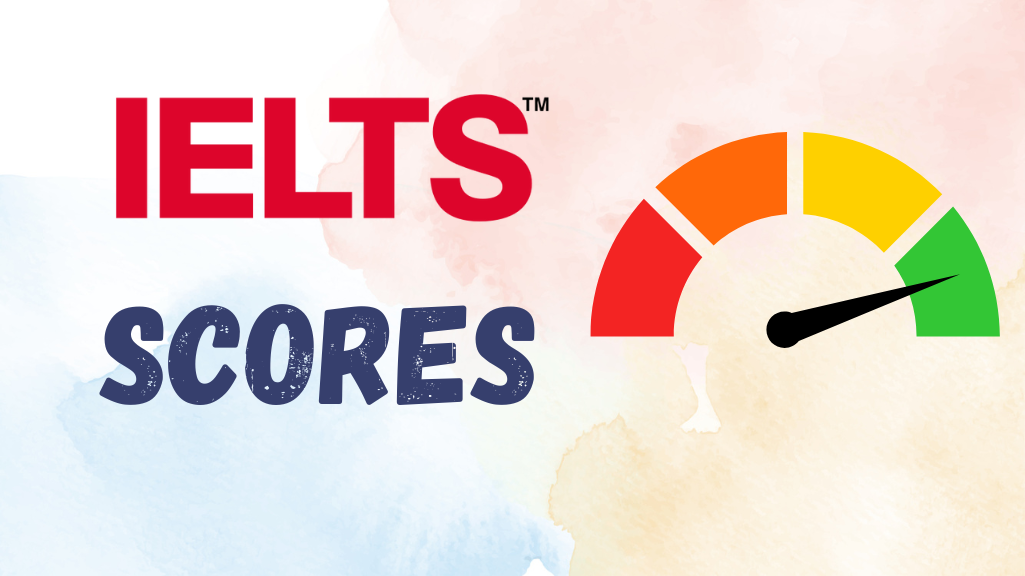So, you’re planning to take the IELTS? Awesome! Whether you’re chasing that dream university, aiming for a job abroad, or settling in a new country, understanding how IELTS scores work is your first big step. Let’s break it all down in a super simple, no-fluff way.
.jpg)
How Does IELTS Scoring Work?
The IELTS (International English Language Testing System) is scored on a Band Scale from 0 to 9. Think of it as a ladder—9 is the top, where you’re a pro at English, and 0 is, well, if you didn’t attempt the test. Each section—Listening, Reading, Writing, and Speaking—gets its own score, and then they’re averaged to give you your Overall Band Score.
Here’s what the bands mean:
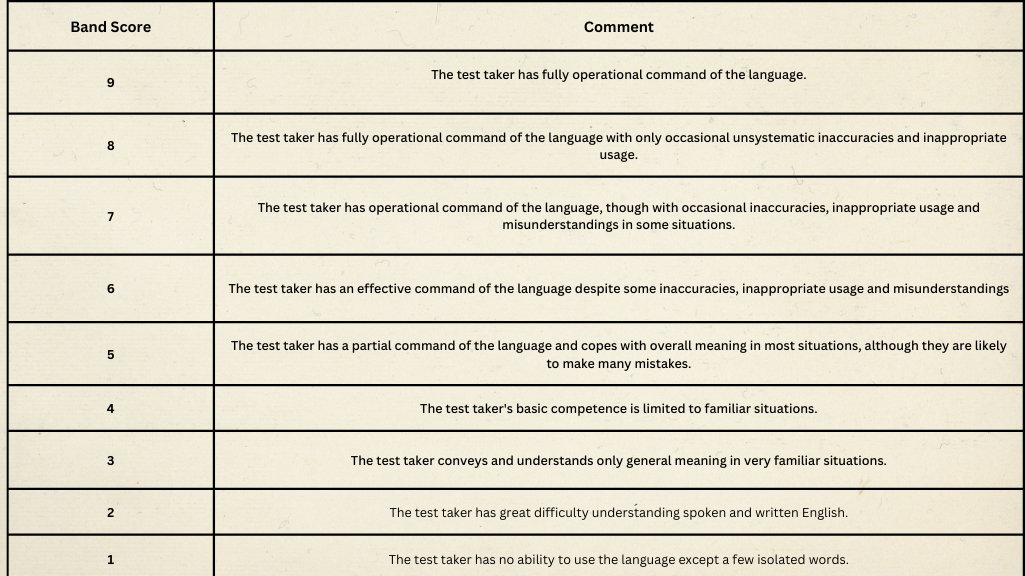
.jpg)
Four Sections Scored and How
- Listening
- 40 questions from four recordings.
- Every correct answer gives you a raw score, which is converted to a Band Score.
- Good news: no negative marking! Take a guess if you’re unsure.
- Reading
- Another 40 questions, with scoring similar to Listening.
- Academic Reading is tougher than General Training, so they have slightly different grading scales.
- Writing
- Two tasks:
- Task 1: Describe a chart, graph, or diagram (for Academic) OR write a letter (for General Training).
- Task 2: Write an essay.
- Graded on task response, coherence, grammar, and vocabulary.
- Two tasks:
- Speaking
- A 12–15 minute face-to-face interview.
- Graded on fluency, vocabulary, grammar, and pronunciation.
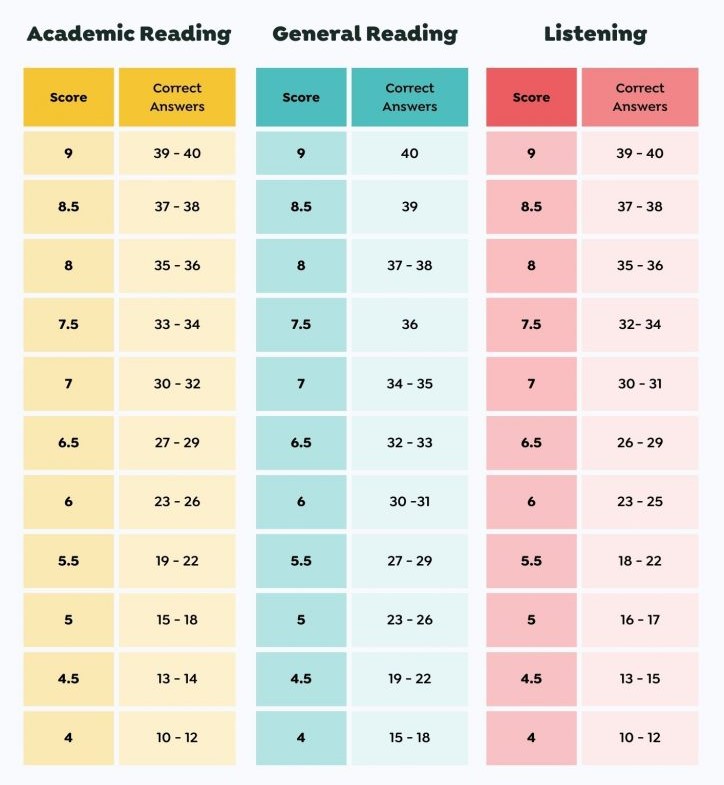
.jpg)
How IELTS Band Scores Are Calculated
IELTS scores range from 0 to 9, with 0.5 increments. Each section—Listening, Reading, Writing, and Speaking—gets a separate score, and the Overall Band Score is the average of these, rounded as follows:
- Ends in .1–.24: Rounded down (e.g., 6.1 → 6.0).
- Ends in .25–.74: Rounded to the nearest 0.5 (e.g., 6.25 → 6.5).
- Ends in .75–.9: Rounded up (e.g., 6.75 → 7.0).
Example
- Listening: 8, Reading: 7.5, Writing: 7, Speaking: 7.5.
- Average: 7.5 → Final score: 7.5.
Fair and straightforward! For more, check the official IELTS website.
.jpg)
IELTS Score by countries
Countries with English exposure, such as Zimbabwe (7.4) and Nigeria (7.1), excel in Speaking. Meanwhile, countries like China (5.5) and Vietnam (5.7) lag, reflecting less emphasis on spoken English in their education systems.
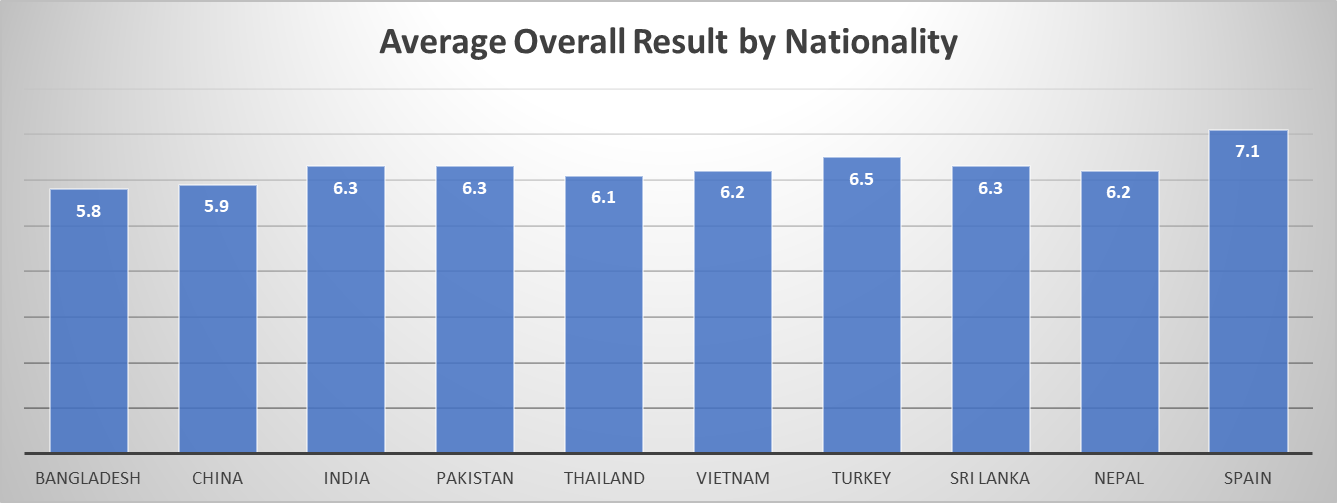
India has a higher percentage of candidates in the higher band ranges (6.5–7) compared to the other nations, making it a relatively stronger performer in IELTS.
Bangladesh and Pakistan have a higher concentration in the lower bands (below 5), with fewer candidates reaching the higher band levels.
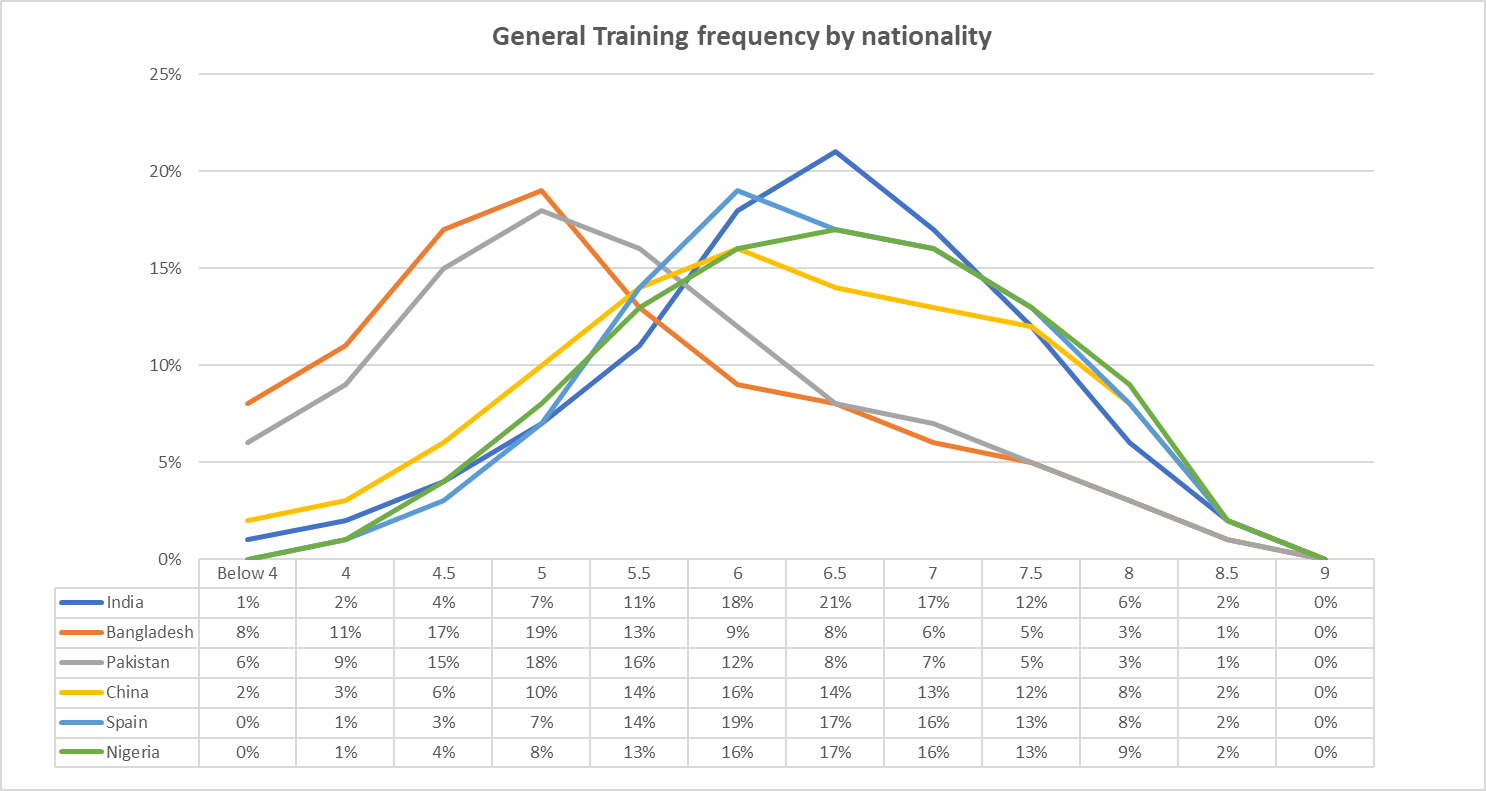
IELTS Score by Gender
The following chart shows score variation between men and women.

.jpg)
Why Do IELTS Scores Even Matter?
- For University Applications: Most universities set their own IELTS requirements.
- Undergrad programs: Usually need a Band 6.0–6.5.
- Postgrad programs: They’re pickier—expect Band 6.5–7.5 or higher.
- For Immigration: Countries like Canada, Australia, and the UK ask for specific scores. A Band 7+ is often the golden ticket for permanent residency.
- For Jobs: Some professions (like doctors or nurses) need a Band 7 or more to prove they can handle complex communication at work.
Following is a table focusing what universities wants from applicants:
| University | Undergraduate IELTS Requirement | Postgraduate IELTS Requirement | Notes |
| Harvard University | 7.0 (overall) | 7.0 (overall) | Requirements may vary by program |
| Massachusetts Institute of Technology (MIT) | 7.0 (overall) | 7.0 (overall) | Typically, no lower score accepted |
| Stanford University | 7.0 (overall) | 7.0 (overall) | Higher score for competitive programs |
| University of California, Berkeley | 6.5 - 7.0 | 7 | Higher scores for specific graduate programs |
| Princeton University | 7.0 (overall) | 7.0 (overall) | Higher requirements for law, business |
| Yale University | 7.0 (overall) | 7.0 - 7.5 | Higher for competitive graduate fields |
| Columbia University | 7.0 (overall) | 7.0 - 7.5 | Competitive programs may require a higher score |
| University of Chicago | 7.0 (overall) | 7.0 - 7.5 | Higher score for graduate programs |
| California Institute of Technology (Caltech) | 7.0 (overall) | 7 | Varies based on specific program |
| University of Southern California (USC) | 6.5 - 7.0 | 7 | Specific programs may require a higher score |
| University of Texas at Austin | 6.5 - 7.0 | 6.5 - 7.0 | Requirements may vary by department |
| University of Illinois at Urbana-Champaign | 6.5 (overall) | 6.5 - 7.0 | Higher score for business, law |
| Michigan State University | 6.5 (overall) | 6.5 - 7.0 | Graduate programs like engineering may require higher score |
| Boston University | 6.5 - 7.0 | 7 | Higher IELTS for competitive graduate programs |
| University of Connecticut | 6.5 - 7.0 | 6.5 - 7.0 | Varies by program, most degrees require 6.5-7.0 |
| University of Miami | 6.5 (overall) | 6.5 - 7.0 | Requirements for business, law, and medical programs may be higher |
Common Myth
1. A common myth is that you need a Band 9 to succeed, but most schools, jobs, and visa programs typically require Band 6 or 7, making a perfect score unnecessary for most candidates.
2. Another myth is that it's easier to get a high score in General Training. However, the difficulty level depends on your personal strengths, and both General and Academic IELTS assess similar language skills, so one isn’t necessarily easier than the other.
3. Lastly, there’s a misconception that native speakers automatically get a Band 9. Even native speakers need to practice, as the IELTS test evaluates skills like grammar, vocabulary, and coherence, not just fluency.
FAQs
Do I need a Band 9 to get into a good university? No, most universities accept a Band 6.0 to 7.0, especially for undergrad and postgrad programs. Only competitive programs may require a higher score.
What’s the difference between General Training and Academic IELTS? General Training focuses on everyday English, while Academic IELTS is for those applying to universities or professional institutions. Both assess similar language skills but in different contexts.
Can native speakers get a Band 9? Yes, but it’s not automatic. Even native speakers need practice, as IELTS measures more than fluency—it looks at grammar, vocabulary, and coherence.
How is my IELTS score calculated? Each section (Listening, Reading, Writing, Speaking) is scored individually, and your overall score is the average of these, rounded to the nearest half-band.
Do universities accept partial IELTS scores? Generally, universities require a full score (Overall Band) rather than individual section scores. Some may have specific score requirements for each section, though.
What’s the ideal score for U.S. universities? Most U.S. universities require a score between 6.0 and 7.0, though more competitive programs may demand higher scores, especially for graduate programs.
Is it harder to get a higher score in the Speaking section? It depends on your comfort with speaking English. The Speaking section assesses fluency, pronunciation, grammar, and vocabulary, so practice helps improve performance.
What happens if I don’t meet the IELTS requirements for my program? Some universities may allow you to take an English proficiency course or offer conditional acceptance. Check specific program requirements for more options.
